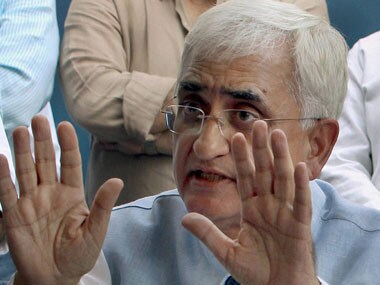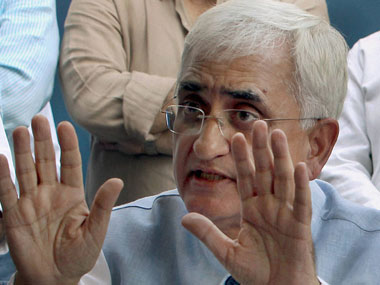For a man given to extravagant rhetorical flourishes — as, for instance, when he dares “guttersnipes” to “come to Farukhabad” — External Affairs Minister Salman Khurshid’s choice of words to characterise the United States’ mercenary spying of the Indian mission in Washington is borderline banal. “It is not snooping,” said Khurshid, offering the US an alibi it didn’t need or ask for. “It is only computer study and computer analysis of patterns of calls.” [caption id=“attachment_925569” align=“alignleft” width=“380”]  Khurshid may be guilty of clumsy articulation when he termed the US snooping operations as “computer study and computer analysis of patterns of calls”, but at least he wasn’t being hypocritical in the way European leaders have been. PTI[/caption] Even US President Barack Obama doesn’t quite feel the need to resort to terminological inexactitude of this sort or understate what is plain and simple modern-day spying to the point of absurdity. As Obama said in response to expressions of outrage among European countries over the recent revelations of extensive snooping of even allies, every country spies on everyone else. “I guarantee you that in European capitals, there are people who are interested in, if not what I had for breakfast, at least what my talking points might be should I end up meeting with their leaders,” Obama said. “That’s how intelligence services operate.” Quite unlike Khurshid’s ready acceptance of the US line that modern-day geopolitics affords no country the luxury of being saintly, European leaders have been frothing at the mouth ever since the latest revelations came about. A pained Italy’s Defence Minister Maria Mauro said: “If we are friends, if we are allies, honestly it is unacceptable that someone in this relationship behaves like the Soviet Union did with its erstwhile satellite states.” Back home, too, Opposition leaders have criticised the Indian government’s readiness to roll over and play dead, despite the revelation that even Prime Minister Manmohan Singh was spied upon during the G-20 summit meeting in London. (Knowing what we know of Singh’s taciturnity, however, it’s a fair bet that that not much damage may have come of that; there’s only so much of the sound of silence that any self-respecting snoop can take.) CPI(M) leader Brinda Karat said that as an Indian, she felt “outraged” by the “shameful spectacle” of its leaders bending over backwards to accommodate US sensitivities — despite having been espied upon. Media commentators to have weighed in with more outrage. Columnist Vijay Prashad notes that India’s response to the revelations of US espionage, laid bare by NSA whistleblower Edward Snowden, is “both shoddy and undignified.” The least that Khurshid should have done was to take the tack that the Europeans did. “To be cavalier about the implications of espionage shows that India, like the US, has become cynical about international law,” he writes. “This is a walk-down from the high ground that India once occupied.” Khurshid’s choice of words in defence of US snooping were, of course, cringe-worthy, but the widely shared sense of outrage over the reality of intelligence-gathering by virtually all countries, including India, comes across as being rooted as much in naivete as in the search for higher moral ground. As _Firspost_ had noted earlier , Indian security agencies too routinely resort to similar “communications intelligence” operations in the interest of keeping India safe. It was such tapping of former President Gen Pervez Musharraf’s secure phone line in May 1999 – at the height of the Kargil war – that gave India the edge and helped turn the tide of that war. It is perhaps true that US security agencies enjoy an asymmetrical advantage over the rest of the world when it comes to snooping ; Indian agencies cannot – and perhaps dare not – spy on the US embassy in Delhi with much the same sophistication that the US does. But that is only a function of their limitation, not of high-mindedness. As strategic analyst Shashank Joshi points out, some of the reactions out of Europe to the NSA revelations are borderline tendentious. In particular, he points to French President Francois Hollande’s demand that the US spying stop ‘immediately’ if it is not to risk jeopardising negotiations on an EU-US free trade agreement as hypocritical. Joshi cites instances in the recent past when the French were perceived as “the evil empire, stealing technology” and “the most aggressive users of espionage to collect foreign industrial and technological secrets.” Khurshid may be guilty of clumsy articulation when he termed the US snooping operations as “computer study and computer analysis of patterns of calls”, but at least he wasn’t being hypocritical in the way European leaders have been. Even the other implied criticism – that India has failed to stand up for its interests when hustled by the US – is somewhat wide of the mark. India has, of course, scored some spectacular self-goals particularly in its neighbourhood. But on most of the issues that define the Indo-US bilateral relationship, India has thus far pretty much had its way – and pushed back aggressively against US overreach. For instance, last year, the Indian foreign policy establishment took the extraordinary step of lashing out at US and Israeli lobbies that have made a habit of cavilling about India’s oil trade with Iran. And to this day, that trade continues, although the US has repeatedly expressed its keenness to see it end. Similarly, India has thus far not yielded ground to US pressure on the nuclear liability bill provision, even though the US has repeatedly painted such action as being arguably ungrateful , given that it was US coercive diplomacy that inducted India back into the nuclear power club. And on the issue of medical patents, too, it’s fair to say that Indian courts and policymakers haven’t exactly capitulated. Sure, Khurshid’s words may have grated momentarily, particularly because they sound like an alibi for US snooping. But on this occasion at least, they captured in spirit (even if not in letter) a rare nuance – and a lack of hypocrisy – that’s admittedly missing in the more inflamed responses to reports of US snooping.
Khurshid’s words may have grated, but on most of the issues that define the Indo-US bilateral relationship, India has pretty much pushed back against US overreach.
Venky Vembu attained his first Fifteen Minutes of Fame in 1984, on the threshold of his career, when paparazzi pictures of him with Maneka Gandhi were splashed in the world media under the mischievous tag ‘International Affairs’. But that’s a story he’s saving up for his memoirs… Over 25 years, Venky worked in The Indian Express, Frontline newsmagazine, Outlook Money and DNA, before joining FirstPost ahead of its launch. Additionally, he has been published, at various times, in, among other publications, The Times of India, Hindustan Times, Outlook, and Outlook Traveller. see more


)

)
)
)
)
)
)
)
)



